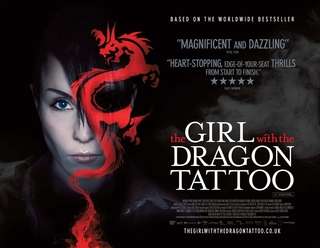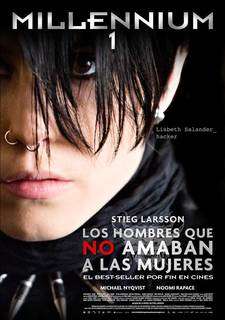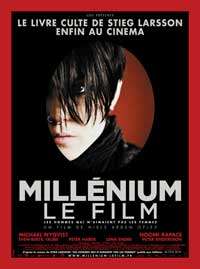 NOOMI RAPACE AND MICHAEL NYQVIST IN THE GIRL WITH THE DRAGON TATTOO
NOOMI RAPACE AND MICHAEL NYQVIST IN THE GIRL WITH THE DRAGON TATTOOPublished on
Cinescene.Very bad rich peopleIt should not be too hard to enjoy the new movie,
The Girl with the Dragon Tattoo. Rarely does the art house audience receive such a juicy piece of stuff as this gruesome Swedish serial killer mystery. The format is spruced up with a kinky investigator romance replacing Sherlock-Watson camaraderie. The background material, exploring which fills up most of the lengthy 150-minute screen time, is made up of shocker family history reaching back to nail big-time European industrialists as not only Nazis but sadistic criminals. This is as good a time as any for some very bad rich people. The investigative unreeling of the story, which comes from the first in a "Millennium" trilogy of international bestsellers, has parallels with Fincher's splendid
Zodiac. The production values of this gory Swedish film are excellent and the acting is impeccable, starting with Noomi Rapace as Lisbeth Salander. As the twisted little lesbian computer hacker with the tattoo and piercings and dyed-black punk hair who teams up with indicted yet charismatic investigative journalist Mikael Blomkvist (Michael Nyqvist), Rapace eagerly gobbles her role.
There's only one trouble.
Zodiac is scrupulously faithful to lurid Seventies America criminology. Despite the detectives' ample use of up-to-date technology,
Girl just feels too much like old-fashioned Euro-trash fantasy. It makes the bad guys bad in every conceivable way, starting out with the offense of being mega-rich capitalists and moving on quickly to anti-Semitism and misogyny; the original film/book title means "Men Who Hate Women." The story line runs so far to sensationalism there's no room for complexity except of plot twists. You're well entertained if flaying, hanging, rape and immolation are recurrent fantasies of yours. But the reliance on showing gore and violence is unnecessary. It's different in a novel where one only imagines them, and Oplef has overly jazzed Larsson's already hysterical catalogues of vice.
Zodiac managed to be scarier without actually
showing its serial killings, something Fincher learned between
Se7en and
Zodiac. You can't help feeling jacked around by Stieg Larsson's novel as director Niels Arden Oplev has transferred it to the screen. There's a certain irony in this, since Stieg Larsson himself was a genuine expert on racist hate crimes and right-wing conspiracies. However, he wouldn't be the first expert to tart up his information too much in molding it into fiction.
Another reason for the film's unsatisfying aftertaste is that as so often with book (I won't say "literary") adaptations, the movie suffers from the burden of conveying too much material in too little screen time. To begin with we're fed a lot of information. We learn that the dysfunctional, ultra-rich Vanger industrialist family is ripping off government funding to set up a fake business in Russia, and that the journalist Mikael Blomqvist, who publishes the magazine Millennium in Stockholm, has just lost a libel case brought by accused Swedish industrialist Hans-Erik Wennerström, which could cause Millennium to go down. In disgrace, Blomkvist agrees to be hired by Vanger, the aged former Vanger companies CEO, Henrik. The old man offers both to rescue Blomqvist's magazine and to supply him with proof of Wennerström's corruption. Blomqvist is officially to spend a year writing the Vanger family history, but the elderly Vanger wants him in fact to go back and solve the case of his niece's disappearance from the family's privately owned island 40 years ago. He's convinced a family member did away with the girl, and he trusts Blomqvist as a journalist -- and no doubt sees he's no publicist for the Vanger family.
All that adds up to a pretty big dose of introductory exposition.
When he comes to the island to work on the case, Blomqvist very quickly begins to see the connection of a series of country-wide murders stretching from the forties into the present. Meanwhile the movie simultaneously starts to fill us in on the story of the Dragon Girl. Evidently she was hospitalized for violent behavior earlier in her life and must still report to a state "guardian." When a new replacement comes he turns out to be an repulsive sex pervert who bribes and threatens Lisbeth while abusing her; then she gets ample revenge. These scenes are creepy, violent, and disturbing. Ingeniously, the plot brings Lisbeth and Blomqvist together by having Lisbeth hack into his investigation -- and contribute to it, when she has insights into the possible serial killing he has found.
The fascination of Larsson's "Millennium Trilogy" evidently arises very much from these two personalities, Blomqvist and Elsbeth, both complex and conflicted, who are gradually drawn together and even become a couple despite Elsbeth's violent, traumatic past and lesbian leanings. This has to be one of the more original detective couples. In contrast the stories of hate, rape, murder, and incest that emerge in the investigation seem at once excessive and conventional. Though we don't really learn quite as much as we'd like to about Blomqvist and Elsbeth's back stories, they still tend to seem more interesting and three-dimensional than the hackneyed catalog of vices served up for the Vangers. These Euro-trash megabucks folks veer into Hannibal Lector territory, but they're not clever or fiendish like Hannibal, just awfully, awfully nasty. The film ends with a resolution of the mystery that is pretty corny and pat, as well as once again breathless and overcomplicated. For the next "Millennium" film -- and there's an American remake of Part I already planned -- I'll need more and better synonyms for "lurid." And I hope the filmmakers get hold of some better-formatted English subtitles. Of these, at least ten or fifteen percent were illegible.
Män som hatar kvinnor (the Swedish title) was released March 19, 2010 in the US.
 ..........
.......... ........
........ 





